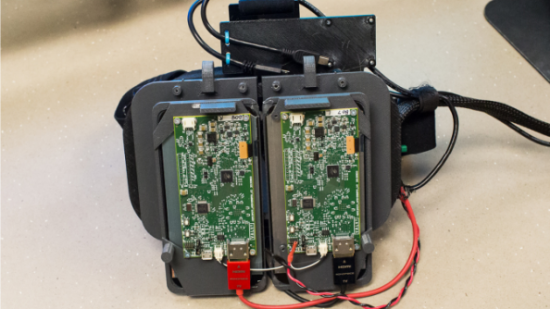At Valve’s Steam Dev Days Michael Abrash led the discussion of what virtual reality means for the PC industry. He succinctly summarises the future of VR in 59 words:
“Compelling consumer-priced VR hardware is coming, probably within two years.
It’s for real this time – we’ve built prototypes, and it’s pretty incredible.
Our technology should work for consumer products.
VR will be best and will evolve most rapidly on the PC.
Steam will support it well.
And we think it’s possible that it could transform the entire entertainment industry.”
We’re in for exciting times.
“I’m sure you’re all familiar with the Oculus Rift DK1, and I’d guess that most of you think it’s just an interesting curiosity at this point,” Abrash said in his talk. “That’s a reasonable take right now, but we think you should pay close attention, because VR is likely to have a big impact much sooner than you think – and Valve’s working hard to make that happen.
“Two years ago, we identified virtual reality as a promising way to enable compelling new experiences. Our research and development since then has led to prototype head-mounted displays – like this one – and a set of demos that together create a powerful sense of what’s known as presence.”
Abrash defines presence as “the sense of being someplace else while in virtual reality; many people feel as if they’ve been teleported.
“Presence is distinct from immersion, which merely means that you feel surrounded by the image of the virtual world; presence means that you feel like you’re in the virtual world.
“Presence is an incredibly powerful sensation, and it’s unique to VR,” he explains. “There’s no way to create it in any other medium. Most people find it to be kind of magical, and we think that once people have experienced presence, they’ll want it badly.”
Abrash is plain spoken when it comes to the Oculus Rift “The [development kit 1] is not good enough to enable strong presence for most people.” However, he recognises the company’s role in making “VR a hot topic again”. He also says that “Oculus’ new version of the Rift, Crystal Cove, offers higher resolution, lower latency, low persistence, and translation, all of which are key elements of presence, as we’ll see later, so it’s a big step in the right direction.”
Oculus, in Abrash’s opinion, “is clearly the leading candidate” for getting consumer VR right. As a result Valve “shared what we’ve learned through our R&D with Oculus. We’ve showed them our prototypes and demos, we’ve explained how our hardware works, and we’ve provided them with feedback on their hardware designs. By showing them a prototype with low persistence, we convinced Oculus of its importance, and the lack of blur in Crystal Cove is a direct result of that. We collaborated with Oculus on tracking as well. We’re continuing to work with them to improve tracking, displays, lenses, and calibration, and we’re excited about where they’re headed. If Oculus executes well, and so far they seem to be, I think they could well deliver strong presence on the PC within the next two years; we hope that happens, because it would be a huge boost for PC VR.”
And that’s Valve’s goal: “to enable great VR for the PC.”
Though that’s not through developing hardware themselves: “We have no current plans to ship VR hardware ourselves,” says Abrash. “But that could change in the future. Right now, we’re just figuring out what’s fun about VR, and as we learn more we’ll do whatever’s needed to enable VR on the PC and Steam.”
I thoroughly recommend reading the rest of Abrash’s presentation. It’s an excellent read and gets in depth with what is required for a VR experience to generate ‘presence’.
But, in essence, VR is coming and it is going to be awesome.
